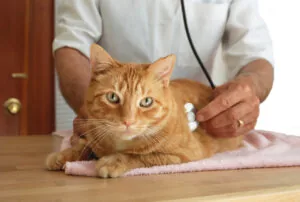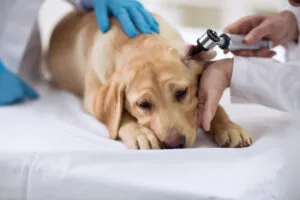June is National Microchip Month
Protect your pet and give yourself the peace of mind this June for National Microchip Month! Here are some important takeaways this month:
- 1 in 3 pets go missing in their lifetime
- Some microchip manufacturers offer lost pet alerts
- 44% of pets have not been microchipped
- Pets are more likely to be returned home if microchipped than if not. Give your pet a chance for a safe homecoming.
- Microchipping is quick and affordable. Be sure to keep your contact information up to date on your pets microchip registration.
What Are Microchips?
A microchip is a permanent method of electronic identification. The chip itself is very small – about the size of a grain of rice – and is implanted subcutaneously (just under the skin) between the shoulder blades at the back of your pet’s neck. Each chip has a unique number that is detected using a microchip scanner. The microchip number is recorded on a microchip database registry with details about the animal and owner.
How Will It Help Me Get My Pet Back If He Is Lost?
It’s only going to help if someone picks up your pet and takes him to a shelter or veterinarian’s office to be scanned for a chip. Some people think chips are like a tracker or a GPS device, but a microchip only works if someone scans the chip.
Once they get the chip’s number, and the company that made the chip, they’ll contact that company to find the owner. This is one of the most important things people need to remember – the chip is only as good as the registration. Many more pets are microchipped than are properly registered. You have to get the paperwork and make sure that chip is registered to you, with your up-to-date contact information. And if you move or you change your phone numbers, you have to update that information.
Do All Scanners Used by Shelters Pick up All Microchips?
Not all scanners pick up all microchips. There are more universal scanners now, but some work better than others. In an ideal world, all shelters would be using a universal scanner that works well to check every animal they find. But in reality, not all shelters have universal scanners that work well. Sometimes they’ll have more than one scanner so they can find different chips. Of course, that assumes they have the time and manpower to scan every animal more than once.
Scanners also depend on using the right technique to know how and where to scan. And chips can migrate, so if they’re scanning over the back and it’s migrated to the side, they may not find it. A really good thing owners can do is at every check-up ask your vet to scan the chip to make sure it’s still reading and it’s still where it should be, on the back near the shoulder blades.
Does a Microchip Replace Identification Tags and Rabies Tags?
Microchips are great for permanent identification that is tamper-proof, but nothing replaces a collar with up-to-date identification tags. If a pet is wearing a collar with tags when it’s lost, it’s often a very quick process to read the tag and contact the owner; however, the information on the tags needs to be accurate and up-to-date. But if a pet is not wearing a collar and tags, or if the collar is lost or removed, then the presence of a microchip might be the only way the pet’s owner can be found. Your pet’s rabies tag should always be on its collar, so people can quickly see that your pet has been vaccinated for this deadly disease. Rabies tag numbers also allow tracing of animals and identification of a lost animal’s owner, but it can be hard to have a rabies number traced after veterinary clinics or county offices are closed for the day. The microchip databases are online or telephone-accessed databases, and are available 24/7/365.
Is Microchipping Painful?
Microchipping is a quick (only takes a few seconds), safe and simple procedure and causes little discomfort. Some puppies and kittens may flinch or yelp as the chip is implanted, however the pain is minimal and short-lived and most animals will forget about it very quickly. Microchipping is very important for reuniting lost pets with their owners. Should your pet go missing you are far more likely to be reunited if he or she is microchipped. The benefits of microchipping in terms of identifying a lost animal and reuniting them with their owner far outweigh any minimal, momentary discomfort.
What’s the Cost of a Microchip?
If your pet was adopted from a shelter or purchased from a breeder, your pet may already have a microchip. Revisit your pet adoption paperwork, or have your pet scanned for a microchip at your next vet visit to reveal the unique microchip ID number and register it. However, if you know that your pet is not already microchipped, the average cost of a chip is $45. If that still seems pricey, remember that microchips don’t need routine care, maintenance, or replacement! They’re designed to last for up to 25 years.
Common Reasons Pets Get Lost
Many pets become lost because they escape from the yard or run outside when a door opens. This is especially true during holidays where loud noises, social gatherings, and unfamiliar faces are common. Even during thunderstorms, many pets can become frightened and run away during these situations in an attempt to escape the noise.
Other common instances where pets go missing include emergencies such as house fires and automobile accidents. A pet who has a microchip is much more likely to make it back home than one without this identification.
Register and Update
It is important to note that a microchip will only be effective if it is registered and contains up-to-date contact information. When you microchip your pet, the vet will give you information to register the microchip with a nationwide registry. You will then be asked to register the microchip and include your most up-to-date contact information. If you do not register and input your information, the microchip is essentially useless as the microchip will not be connected with information to help your pet be returned to you. If your information changes, be sure to update your pet’s profile immediately.
Up to 8 million animals end up in shelters every year. Unfortunately, only 15-20% of dogs and less than 2% of cats are ever reclaimed by their owners. One of the ways to increase the chances of finding your lost pet is having your pet microchipped.
Share This Post
Recent Posts
About Shallowford Animal Hospital
Shallowford Animal Hospital and The Pet Spa at Shallowford are dedicated to the exceptional, compassionate care your pet deserves. Pets hold a very special place in our families, and we treat yours like our own.



